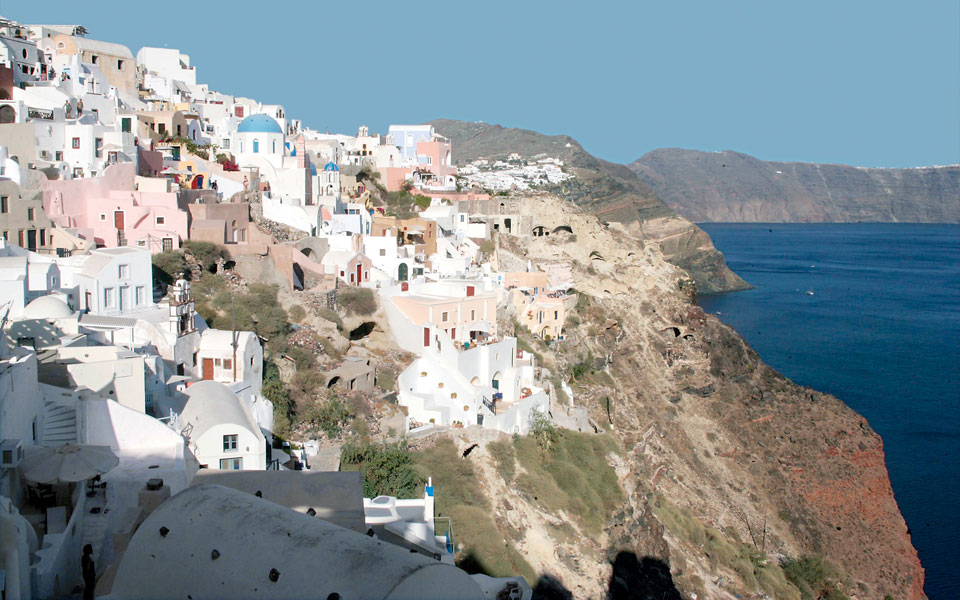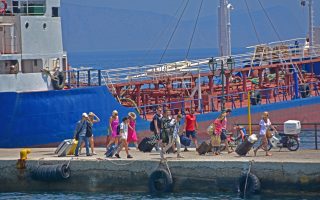Greece opens up tourism for its ‘most difficult’ summer

For Giorgos Georgoulas, an experienced tourism professional on the world-renowned Greek island of Santorini, this summer will be really tough for tourism.
"This is a tragic, a disastrous year. We will just try to cover a fraction of our expenses this summer," said Georgoulas, who runs a boat tour agency at Oia town on Santorini.
On Monday, Greece reopened its border and some of its airports to tourism, after months of restrictions that helped contain the spread of the Covid-19. Yet despite the state's multiple efforts to save some of the year's tourism revenues, industry professionals are bracing for a season all but lost.
"Ahead of us we have got the most difficult summer ever," said Greek Deputy Minister of Tourism Manos Konsolas on Saturday.
Athens, the capital, is all alert for any resurgence of Covid-19 clusters. "We are opening our gates to the world, but we are not finished with the coronavirus just yet," admitted government spokesman Stelios Petsas last Friday.
"We may have 4,000-5,000 imported cases over the summer, based on our worst-case scenario," Dr Nikos Sypsas, a professor of medicine at the University of Athens who sits on the specialist committee advising the Greek government on the coronavirus pandemic, told local Mega TV on Monday.
"I do not want to make Greece the No.1 destination; I want it to be the safe destination," Greek Prime Minister Kyriakos Mitsotakis told Xinhua and other international media Saturday on Santorini.
"Our top priority is the safety of visitors and workers, which is why we have taken all the necessary measures," he said Monday at the Ancient Agora of Athens, while marking the reopening of the country's museums after a three-month shutdown. Archaeological sites have already been open to visitors since May 18.
The Greek economy, which is predicted by the European Commission to shrink 9.7 percent in 2020, cannot afford to shut tourists out completely this year, given that directly and indirectly tourism contributes about 20 percent of the country's gross domestic product (GDP), Nikolina Kosteletou, professor of economics at the University of Athens, told Xinhua.
According to the definitive data for 2019 from the central bank of Greece, last year record tourism revenues of 18.18 billion euros were collected from the 33 million tourists who visited the country, also an all-time high.
A study carried out by the state-funded Center of Planning and Economic Research (KEPE) in April showed that for every billion of euros of lost tourism revenues, the country's GDP contracts by 0.57 percent and employment diminishes by 0.61 percent, which illustrates the significance of tourism revenues for the Greek economy in general.
"The actual level of losses will depend on the duration of the health crisis and its consequences on international tourism traffic," KEPE noted.
It is no wonder then that Athens is trying to boost both domestic and international tourism.
As of Monday the airports of Athens and Thessaloniki are receiving international flights with only random coronavirus tests for those from cities with a good record in containing Covid-19.
Passengers from other countries are also allowed entry, though not yet for those from the UK and Turkey, while land arrivals from Bulgaria are permitted.
A further opening up is expected from July 1, when regional airports will open to international flights. Sailings from other countries and seven overland border points will also start operation. Tourists will be subject only to random sampling.
Visitors who test positive will be quarantined in a hotel for 14 days and their health will be closely monitored.
The "Greece from Home" online promotional campaign in spring, which aimed to keep the country in potential visitors' mind during lockdown, has now been replaced by an open invitation such as the one from Mitsotakis on Santorini and a video message calling on travelers to enjoy their Greek summer.
The government has also tripled the budget for the so-called "Tourism For All" program to 30 million euros, subsidizing this year not only the accommodation but also ferry tickets for some 250,000 Greek citizens wishing to visit the country's islands.
A special network of health centers, hospitals and hotel-affiliated doctors has been created to cover all destinations, along with specific plans for emergency patient airlifts.
"We are going to rely mostly on Greek tourists this year," said Dimitris Kastriotis, a hotelier on the island of Spetses, who has experienced numerous cancellations for this summer.
"Our occupancy rate will come to just 40-50 percent," he told Xinhua on Monday, when he opened his hotel for the season.
Mr Georgoulas from Santorini expects even fewer customers. "I believe we will only have minimal business in July and we aspire to have about 20-30 percent of normal tourism traffic in August and September," he said.
"At least we get plenty of interest from visitors up to the age of 50 years, who remain eager to come to Greece," he added with a note of hope in his voice.





